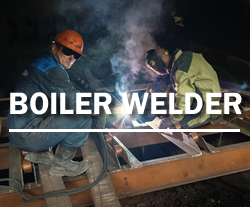 Do you have plenty of physical stamina and strength, the ability to work in confined spaces and are heights a piece of cake as far as you’re concerned?Then take a look at the first in our new Careers in Metals series on what it takes to be a Boiler Welder. It’s a pressure cooker career for certain but properly skilled boiler welders are in high demand & well paid. Read on to see how this profession helps keep our economy functioning in applications such as power stations and petrochemical plants… |
| Q. What exactly is a boiler?
A. Before finding out what’s it like to be a boiler welder, it is important to understand what a boiler is. Boilers, tanks, and vats are large containers used in power stations, buildings, factories, and ships that are used to heat water and other fluids under extreme pressure to generate power and heat. Q. What makes a boiler welder such a special profession? A: Boiler welders need to feel like they could fly – not literally – but they certainly need to feel pretty comfortable 60 to 70 meters up in the air with limited light, when working in extreme temperatures, and while installing a piece of pipe on an existing tightly packed bank of tubes. The pipe material they’ll be required to work with is made from specialised steels that require very specific heat inputs and controlled pre-heat and post-weld heat treatment. Q. What exactly does a boiler welder do? A. Typically, a Boiler welder is required to weld small-bore piping inside the boiler, this may require the welder to enter the boiler through small openings on the side and in some areas crawl to the place of work. A boiler consists of multiple pipe layers on top of one another so it may require for the pipes to be pulled open with chain blocks. The welder would then lie on his stomach and start the weld at 6h00 progressing vertically up to the 12h00 position, these welds require a special skill level since the material is difficult to weld and the quality needs to be of X-ray quality. Q. Which specific skills do you need to be a boiler welder?
Q. How much can you earn as a boiler welder? A. Boiler welders can expect to earn an average salary of R45 000 a month. It is worth noting that there is currently a due to the high demand for skilled boiler welders in South Africa. They are therefore sought after by employers because their skills are unique and not easily taught. This is therefore a highly rewarding career that will allow you to stand out from other job seekers. Q. How can the SAIW help you pursue this career? A. To start your career as a boiler welder you would need to complete an SAIW Practical Welding Course where you will learn to join sections, pipe and plate and fabricate large and small pressure vessels. You will also be taught how to select the correct equipment, process variables and welding techniques depending upon the material being joined, and become skilled in grinding and cutting equipment to prepare welded joints. Key welding processes that will be taught include:
The SAIW also offers the International Institute of Welding’s (IIW) International Welder (IW) qualification programme which includes a highly specialised pipe welders qualification which is highly recommended for those seeking to enhance their career in boiler welding. Q. How flexible is the training schedule? The SAIW Practical welder training programs can be tailored to suit an individual’s needs and can also be booked on a week-by-week basis. To obtain a personalised assessment of your career needs and a tailored recommendation of courses please email info@saiw.co.za and our student liaison officer will be in touch. **FOR MORE OF AN IDEA OF WHAT IT’S LIKE TO BE A BOILER WELDER TAKE A LOOK AT THESE VIDEOS: |


